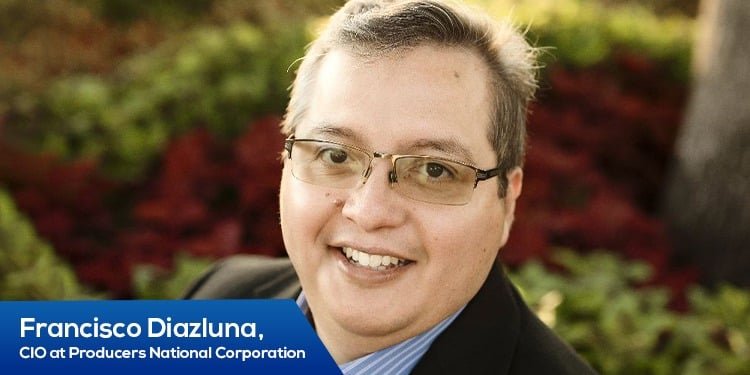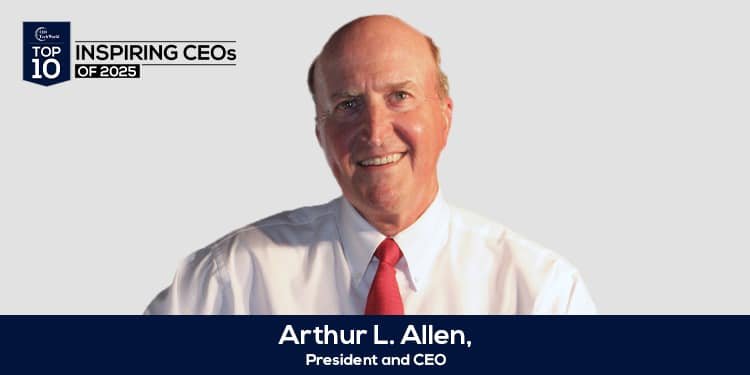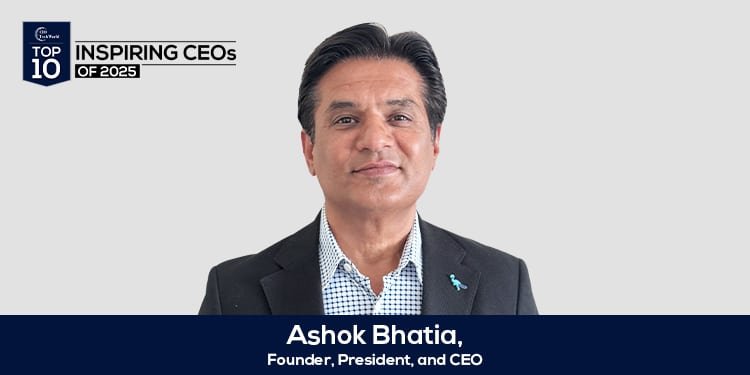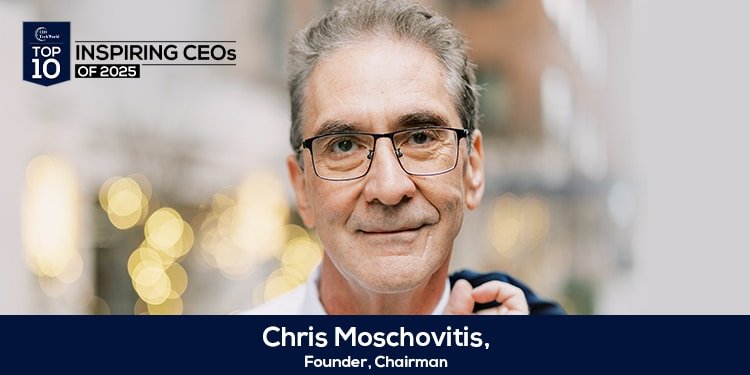Today, Francisco Diazluna is widely recognized as the CIO of Producers National Corporation, an experienced technologist who plays a pivotal role in implementing the company’s digital and transformational initiatives. However, his extraordinary career story, which led him to his current position, had a rather humble beginning, although not entirely humble. Diazluna earned a Computer Science degree from the Autonomous University of Chihuahua, where he graduated at the top of his class as the youngest magna cum laude and valedictorian.
After graduating, Diazluna secured an impressive job working for the Federal Government in Mexico as a Department Chief for a regional office when he was just 21 years old. His world seemed like an oyster where he held significant importance. However, due to political circumstances, he made the difficult decision to leave behind this comfortable environment and move to the US.
Unfortunately, his once-flourishing world of opportunities ceased to exist, and his limited ability to communicate in English restricted his job options. This experience was undoubtedly humbling. Nevertheless, he didn’t give up. After working as an administrative assistant for two years, he gradually learned to communicate in English. Diazluna persevered, continuously learning and growing in his career.
His journey from an administrative assistant to a junior developer, then to Technical Architect, and finally to the esteemed position of CIO can be described as a roller coaster ride spanning over two and a half decades. Diazluna faced numerous ups and downs, experienced loss and hope, and encountered various challenges and opportunities along the way. Despite the obstacles he encountered, his determination and resilience propelled him forward, enabling him to achieve remarkable success.
Let us now delve into the exciting ride of Francisco Diazluna’s career.
Describe your career progression from the start to where you are and what were pivotal decisions, moves you made, circumstances, and other facts that facilitated your growth.
I was born and raised in Chihuahua, MX. I graduated with a Computer Science Degree from the Autonomous University of Chihuahua, the youngest, top of my class, magna cum laude, and valedictorian. After graduating, I landed a great job working for the Federal Government in Mexico as a Department Chief for a regional office. I was 21 years old then, and people would call me “El Señor Licenciado” (cannot be translated, but it is a term of respect in Spanish), making me feel very important and that the world was my oyster.
During the year 1999, the ruling party lost the election, so I was likely going to be out of a job, and I was given the opportunity to come to the United States. My parents lived in Chicago, so my wife and I left everything behind, and with $600 to our name, we moved to Chicago. Since I was so successful in Mexico, I was sure organizations in the US would fight each other for the pleasure of having me work with them. I was very wrong.
I realized that with my level of proficiency in the English language, I simply couldn’t communicate with people, so working in information technology was not an option. Just finding a job was difficult because I couldn’t communicate effectively.
A staffing company found me a job as an Administrative Assistant for a small Insurance Company in the Chicagoland area. My inability to communicate was so bad that I was asked if I knew the alphabet to help file some folders. This was definitely a very humbling experience for “El Señor Licenciado”. Hindsight, the type of leader I needed to be, wouldn’t have been possible with the attitude I had when I was back in Mexico, and going through this phase in my life was probably the worst and the best thing that could have happened to my professional development, because I had so many lessons that later would become handy as a leader.
After two years working as an admin assistant, I could finally communicate in broken but decent enough English. The organization gave me the opportunity to move to the technology department as a junior developer. This was another humbling experience because so many people were patient while working with me. The process of gathering requirements would go like this. They would describe an issue; I would then have to translate in my mind what was said, think about it, come up with a solution, translate the solution in my mind, and then respond back. As you might have guessed, this process took quite some time, while the other person was just patiently waiting in awkward silence, waiting for my brain to complete this process. I’m sure I wouldn’t be where I am if I didn’t have the patience and support I received during these critical years from many of my peers.
Technology has always been my passion and second nature to me. This allowed me to advance my career in the organization from jr developer, to developer, to senior developer, to software architect, to development manager, to assistant vice president. After 12 years, I was finally in a similar position to when I left the federal government in Mexico. I believe everything happens for a good reason, and in this case, it was to prepare me to be a better leader. During my tenure, I had the opportunity to help implement a paperless system, a few versions of our website, a stock management system, and two policy administration systems. I also pursued an Executive Scholar Certificate from Kellogg School of Management in General Management. The organization finally gave me the opportunity to run the IT organization and work as the VP of IT. This allowed for new experiences like working with the board of directors, which helped shape my perspective of technology in different ways.
I wanted to apply many of the lessons learned during all those years to help other insurance organizations, and after 17 years, I decided to step down as the VP of IT and took a role as Technical Architect for a large consulting firm. I had a blast. The organization quickly realized that I could add more value, so within two years, I moved from Technical Architect to Solutions Architect to AVP of Implementations and Regional Director. The reason for these promotions was purely driven by my willingness to increase the influence I had on how to help other organizations with their technology implementations. You cannot fake this sentiment; people quickly recognize intention and ability. I had great support from my leadership, and I was able to contribute to their incredible success. I worked there for a couple of years, and I was pretty comfortable in my role when an opportunity to return to a CIO position came up, and I couldn’t resist. It had the best of both worlds, I could impact multiple organizations because it was an opportunity to work with a holding company with multiple brands and insurance carriers, but unlike consulting, I also had the opportunity to make the decisions to help the organizations in their technology journeys and how to succeed.
Since I took the CIO role, I have been fortunate enough that my team and I have received some recognition, like being a finalist for the CIO of the Year award by ORBIE or being a member of the Forbes Technology Council. I’m happy for the recognition and feel blessed by it, but I see them more as a tool to get me out of my comfort zone and also to make my team proud and happy to be part of something bigger than us. I no longer perceive myself as “El Señor Licenciado”; instead, I go back to the time when I couldn’t communicate and had to work hard just to have the opportunity to work in technology. I always think about how blessed I am and how to act in a way that makes that younger version of myself proud.
It is my hope that my professional development inspires others, immigrants or otherwise, to continue to pursue their professional journey. If a guy who once was asked if he knew the alphabet can now run the technology department for a multi-million-dollar organization, you can certainly do it too.
- What are the key skills and qualifications that aspiring tech executives in the tech industry should focus on developing to enhance their career prospects?
Here are the top 3 that come to mind:
- Understand the strategic objectives of your organization and align everything you do to move them forward (OKRs, Targets, Objectives, etc.). It is easy to get distracted by many other things, but it is most valued when everyone pulls in the same direction. You should be just as proud of the things you say “no” to as the ones you said “yes” to.
- Add Value in any way you can. This skill is intentionally loosely defined because adding value can take many forms and can be technical, tactical, organizational, or cultural. The point here is to look for opportunities where your contribution can add value. One thing I tell my mentees is to think like you are the owner. This is a great leadership attribute to have, and all organizations highly value it.
- Be the change you want to see. Don’t wait around until your circumstances change. If you are not comfortable with your organization, look for those things that you can control and start making immediate changes. People will notice and likely follow.
- What are some key milestones or achievements that tech executives should aim for at various stages of their career to demonstrate their growth and readiness for higher-level roles?
Technical Lead Role: Strong contributor, leadership, accountability, and transparency. Add value.
Supervisor Role: Above skills plus seeing your team as a self-extension while practicing empathy. Add value.
Manager Role: Above skills plus having a multiplier attitude and empowering others. Focus on people as your greatest asset. Add value.
Director: Above skills plus effect a cultural transformation and incorporate openness and intrapreneurship. Add value.
VP: Above skills plus focus on asking the right questions with the genuine objective of promoting growth and enablement. Add value.
CIO: Above skills plus define strategic objectives. Allow your teams to try new things. Keep most of the blame and share most of the credit. Add value.
- How important is it for tech executives to actively seek out mentorship or coaching opportunities to advance their careers? What benefits can they derive from such relationships?
We can learn through our own experiences and failures, or we can learn through the experiences and failures of others. It is impossible for anyone to have all the answers, so it is critical to surround ourselves with mentors and coaches, if nothing else, to help us identify our blind spots or as a good sounding board before we embark on costly endeavors.
- In your experience, what role does professional networking play in the career progression of tech executives? How can tech executives effectively build and leverage their networks?
The most successful leaders tend to focus on paying it forward, which is their first motivation to network with like-minded professionals. It is not about what you can get out of your network but what you will be able to contribute to the growth of others. Be genuine in your desire to help others, and your network will be there when you need them for leverage or career progression.
- Are there any specific certifications, advanced degrees, or executive education programs that can significantly enhance the career prospects of tech executives in the tech industry? Which ones would you recommend?
Being a master of your craft is just the price you pay to play. From there, you need to build up your business acumen. Look for opportunities to learn three important things (1) what’s considered valuable in the industry your organization is in, (2) formal business management executive education, and (3) leadership and people development.
- In your experience, what role does professional networking play in the career progression of tech executives? How can tech executives effectively build and leverage their networks?
Being an immigrant, my professional network extended to 1 person, my wife. It is incredibly difficult to build a network of trusted and like-minded professionals. It is not just about connecting via professional networks; it is about spending time and committing to those close relationships. There are so many individuals in our professional network that have strengths in different areas than ours. Utilize your strengths to share with others, and work with others to do the same. If you are genuine with your connections, they will be more than willing to help you. If you are perceived as a subject matter expert, you don’t have to look for opportunities; opportunities will knock on your door.
- How important is it for tech executives to cultivate a personal brand and establish thought leadership within the industry? What are some effective ways for tech executives to showcase their expertise and gain visibility?
Cultivating a personal brand is extremely important; the interesting thing here is that you first need to know who you really are as an individual, what motivates you, what keeps you up at night, and what you look forward to when you wake up every morning. For me, I value emotional intelligence, transparency, and accountability, so everything I do has to reflect those values. I don’t think particular values make a good brand. It is more about discovering what motivates you and using that to your advantage. To showcase your expertise, look for speaking engagements, collaboration, and writing opportunities. Always be willing to help others; there is no better way to show your expertise and gain not only visibility but credibility and trust.
- Lastly, what advice would you give to aspiring tech executives who are looking to accelerate their career progression and make a lasting impact in the tech industry?
Be genuine, never stop learning, find mentorship opportunities, give back to your community, see good in people, be a leader regardless of position, help others succeed whenever you can, delegate using clear guidance and expectations, embrace failure and see it as a learning opportunity, take more than your fair share of the blame, and less than your fair share of the credit.

As a visionary Business and Technology Leader, I bring a proven track record of driving innovation, fostering collaboration, and delivering exceptional results in fast-paced and dynamic environments. I have honed outstanding skills in articulating a compelling vision and rallying active support from internal executives, development teams, and client business and IT leadership. I am proud to be a member of both the Forbes Technology Council and HITEC (Hispanic Technology Executives Council), which underscores my commitment to being at the forefront of industry trends and developments.
My special talent is demonstrating value to clients at all touch points – I instill these concepts in my teams.








